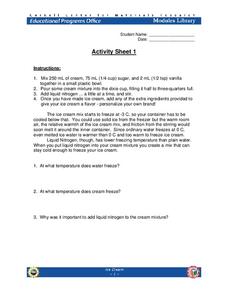Space Awareness
Let's Break the Particles
Build learning by breaking atoms! Young scientists study the way energy changes with a hands-on activity. As they roll steel marbles down a ramp, learners test the hypothesis that kinetic energy does not go away with friction...
Curated OER
It's Elemental, My Dear Students
Eighth graders research the structure of the atom. They identify the properties of subatomic particles, including mass and electrical charge. Students access the websit www.chem4kids and extract 10 main facts from the content provided...
Curated OER
Introduction to the Periodic Table of Elements
Learners explain how the elements are arranged in the periodic table. In this chemistry lesson, students determine the subatomic particles for certain elements. They research the physical and chemical properties of an element they chose.
Curated OER
Composition of the Atom
Young scholars investigate the structure of the atom and its composition. In this atom structure instructional activity, students find the area of cut out circles and drop pens into the circles. They count the number of marks in the...
Curated OER
Atomic Musical Chairs
An engaging activity enlightens young chemists in this lesson on atomic structure. They play musical chairs through a series of concentric circles that represent electon orbitals. A laundry basket in the middle holds the protons and...
Curated OER
Matter & Subatomic Particles
Seventh graders divide into small groups to construct several models. Each group builds with an accompanying chart showing the colors of gumdrops used for the protons, electrons, and neutrons.)
Curated OER
Understanding: Uncertainty
Students discuss the Heisenberg uncertainty principle and how it applies to the subatomic world. Working in groups, they design a model that would help others to understand the uncertainty principle. Written explanations are included...
Curated OER
Difference One Proton Makes
Chemsitry aces learn that protons are located in the nucleus and the number of protons in the nucleus determines the atomic number of an element. In this instructional activity, they compare materials made up of a single element and...
Curated OER
Structure of the Atom
Students identify the location and change of the subatomic particles of an atom. They name the three subatomic particles. Students review what they can recall about subatomic particles. They are given a worksheet on the subatomic...
Curated OER
Chemistry E3 Lesson Plan
Ninth graders perform a series of experiment to investigate heat transfer and phase changes. In this physical science lesson, 9th graders identify and calculate the different subatomic particles. They explain the importance of scientific...
Curated OER
Protons, Neutrons, and Electrons
Using the periodic table of elements, young chemists fill in a chart of isotopes to show the atomic number, mass, charge, number of protons, number of neutrons, and number of electrons. The chart is followed by 11 questions that...
Curated OER
Up and Atom
"Up and Atom" is a mini-unit introducing middle-schoolers to the wonders of elements. Participants draw atom models, examine the periodic table, compare samples of metals to nonmetals, identify unknown elements, and more! The beginning...
Curated OER
Mystery : Structure of the Atom-A Case for Indirect Evidence
Students investigate the structure of the atom through hands on activities. In this atomic structure lesson, students perform 4 activities showing indirect evidence of the structure of the atom and the parts of the atom. They also list...
Curated OER
Teaching Atomic Structure Using Cooperative Learning
Individuals in a group of four each take on a different role: atomic number expert, mass number expert, isotope expert, and nuclear atom expert. They teach each other about their area of expertise. As an assessment, a short quiz is...
LABScI
Atomic Structure and the Periodic Table of Elements: The Secret Agent Lab
Food always gets attention! Model atomic structure using fruit loops to represent the subatomic particles. After building models, scholars create ionic bonds using their models. Finally, they use these concepts to create a periodic...
Cornell University
Isotopes
What better way is there to learn about isotopes than to play with them? Chemistry students manipulate the number of protons and neutrons in a hands-on activity. Individuals try to score the largest number of points...
Curated OER
Build Your Own Atom
Students build a model of an atom using an online program. In this chemistry activity, students discuss the different parts of the atom. They complete an independent research about their chosen element.
American Chemical Society
Protons, Neutrons, and Electrons
Atomic bombs harness the power in the nucleus of an atom, creating devastating power and damage. Classes review parts of an atom by charging a piece of plastic and holding it near their fingers, discussing what is happening and why....
American Institute of Physics
Dr. Gates and the Nature of the Universe
What do Russian nesting dolls have to do with physics? They make a great demonstration tool for explaining Dr. Sylvester James Gates, Jr.'s string theory to young scientists. A two-part lesson first introduces learners to Dr. Gates'...
Curated OER
The Structure of the Periodic Table
Learners investigate the periodic table, the structure of the atom and the subatomic particles. In this periodic table lesson plan, students complete 5 activities in order to better understand atoms and the periodic table. They use...
Curated OER
Ion (Derstand) Bonding through Energy Level Diagrams
Ninth graders investigate ionic bonding through energy level diagrams. In this ion bonding lesson plan, 9th graders observe demonstrations to show energy level diagrams using magnets to represent the subatomic particles. Students fill...
Curated OER
If My Configurations are Correct
Students write the electron configuration of elements in the ground state. In this chemistry lesson, students draw how subatomic particles are arranged in the atom. They construct Lewis dot diagrams of valence electrons.
Virginia Department of Education
Average Atomic Masses
Facilitate learning by using small objects to teach the principles of atomic mass in your science class. Pupils determine the average mass of varying beans as they perform a series of competitive experiments. They gather data and...
Curated OER
Cosmic Rays
Students study cosmic rays and the energy behind them. For this atmospheric lesson students complete a cosmic ray telescope project.























